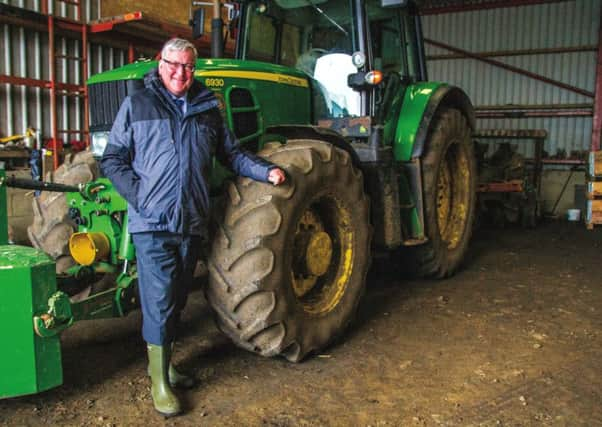Vision Scotland's First person: A life to cultivate


They safeguard and channel social and local history and knowledge of rural skills and traditions.
We know that the rural economy is not without its challenges. While the population in what is termed “mainly rural” areas of Scotland has grown in the past ten years by nearly 5 per cent, the population in islands and remote rural areas has only grown by 1.8 per cent and has in fact declined in Argyll and Bute and the Western Isles.
Advertisement
Hide AdAdvertisement
Hide AdThis government is determined to keep people on the land and just as importantly, to encourage more people to stay, settle and build lives and families in rural communities.
We must therefore recognise that people living in rural Scotland face specific issues, distinct from those faced by urban Scotland. Rurality, sparsity, remoteness and isolation all make providing services like transport, housing, schools, shops and health more difficult.
So what is the Scottish Government doing to help? Well, firstly we are continuing to support farmers and crofters – who I believe are the “backbone” of our rural economy.
We provide them with funding of around £500 million per year – through European Union and Scottish Government funds – which supports jobs, sustains businesses and local economies.
Across the wider rural economy, we are investing heavily to improve infrastructure, including £600m to deliver 100 per cent superfast broadband coverage by 2021, because we realise that fast and reliable internet is fundamental for the future economic and social success of communities across Scotland.
We’ve also spent £20bn on transport projects in the past ten years – which includes dualling the A9 from Perth to Inverness, and the A96 from Inverness to Aberdeen, and we are working with stakeholders to see where we can improve public transport funding and regulation, via the Transport Bill.
Through our economic and community development agency, Highlands and Islands Enterprise, we’re supporting businesses and individuals, developing growth sectors, and creating the conditions for a more competitive economic environment in many of Scotland’s rural areas.
We are also the first government to set up a new body to support economic development in the south of Scotland.
Advertisement
Hide AdAdvertisement
Hide AdWe’ve underpinned record years for Scotland’s food and drink sector, with over £6bn of Scotch whisky, salmon, Scotch beef and other products being sent overseas last year, and food and drink tourism rising steadily – with visitors spending nearly £1bn on food and drink in Scotland during 2016.
That was only possible due to collaboration across the sectors to sell or market our remarkable products, and create or enhance our national brands.
We recently passed Scotland’s first ever forestry legislation to further boost this £1bn sector.
Working with our agencies we have recently seen in rural Scotland major new investments in fish farming across Scotland.
In many aspects, the rural economy is doing well, thanks largely to successful partnership working and a real spirit of collaboration across many key sectors.
Every day, the Scottish Government works with businesses, agencies and communities on a “Team Scotland” basis to grow sustainably the rural economy.
However, with the impending arrival of Brexit, the rural economy faces its greatest threat in a generation – not least in terms of the future of rural funding support, where the UK Government must provide urgent clarity.
As Rural Economy Secretary, one of my jobs is to continually press for an answer to those questions.
Advertisement
Hide AdAdvertisement
Hide AdHowever, the Scottish Government is not sitting around waiting for answers to a problem that is largely out with our gift.
We have taken action to try to understand the potential impacts of Brexit on Scotland’s agriculture, and put the appropriate strategies in place to mitigate those impacts.
Last year, I appointed four “Agriculture Champions” with a remit to advise on a new strategy for the agriculture sector.
They recently published an interim report which, among other things, advised on a long-term process which challenges industry leaders to become more innovative and entrepreneurial, in order to significantly increase productivity.
To support this, the Scottish Government is doing what we can to link better research and development with on-farm practice, as well as encourage businesses to be more collaborative and do more to attract “new blood” to the sector.
I also appointed a National Council of Rural Advisers, to highlight the potential implications for rural Scotland after leaving the EU, and to advise on where best we should focus our resources. Their interim report has just been published and highlights (among other things) the importance of a diverse economy, the retention of local services, and the migration of EU nationals to Scotland – among other things.
We’re also bringing rural communities and decision makers closer together, with the establishment of a rural parliament.
So we are working to understand the problems and put solutions in place.
Advertisement
Hide AdAdvertisement
Hide AdScotland’s rural economy is not without its issues, but by understanding and addressing those issues, we are working to maximise the potential that rural Scotland can generate – which is of course to the benefit of the wider economy of Scotland.
By doing so we strengthen our international brand and remove the false demarcation between rural and urban populations – generating confidence and optimism across Scotland as a whole.
This article appears in the SUMMER 2018 edition of Vision Scotland. An online version is available here.